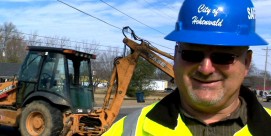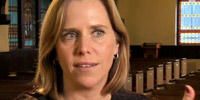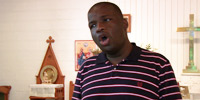In This Episode << SLIDE LEFT TO SEE ADDITIONAL SEGMENTS
Two Pastors
BOB ABERNETHY, correspondent: If you have ever wondered what it is like to be the pastor of a church, there’s a book out about that. It’s This Odd and Wondrous Calling, by two seasoned United Church of Christ ministers who are well aware of ministry as it really is—the joys, the problems, and the things that can drive pastors crazy.
At the Wellesley Congregational Church in Wellesley, Massachusetts, outside Boston, the senior minister is the Reverend Martin Copenhaver.
REV. MARTIN COPENHAVER (preaching from pulpit): We worry about so many things, so Jesus says what we all long to hear: Do not be anxious. Do not worry.
ABERNETHY: At the First Congregational Church of Glen Ellyn, Illinois, a suburb of Chicago, the Reverend Lillian Daniel is senior minister.
REV. LILLIAN DANIEL (to congregation): Let us greet one another with a sign of God’s peace. Peace be with you.
ABERNETHY: Recently, Lillian and Martin were together in Glen Ellyn. They talked with us about the church and its challenges.
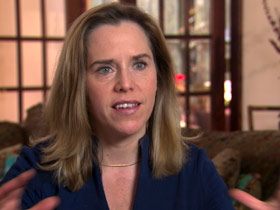 DANIEL: This is what drives me so crazy about the “spiritual but not religious” people who see God in the sunset. You know, anybody can see God in the sunset. But what is remarkable is that you can see God in the committee meeting with other people who you disagree with, and that’s to me the miracle.
DANIEL: This is what drives me so crazy about the “spiritual but not religious” people who see God in the sunset. You know, anybody can see God in the sunset. But what is remarkable is that you can see God in the committee meeting with other people who you disagree with, and that’s to me the miracle.
COPENHAVER: God can actually be found inside the church among flawed, quirky, broken people who are somehow bound together, and try to even see God in one another.
ABERNETHY: Ministry is constant, they said, never 9 to 5, and preaching is just part of it. They insisted ministry is often fun, and Lillian spoke of what she called the weird interplay of the sacred and the earthy.
DANIEL: The time right before you are leading worship, and so you’ve got a sermon that you are trying to memorize, and you are trying to be prayerful and lead hundreds of people in worship, and you walk in the sanctuary, and somebody says, “Lillian, we’re out of toilet paper in the men’s room.”
ABERNETHY: Lillian has been a pastor for 19 years. She has seen a lot of life. She once played bass guitar in a punk rock band, and she still sits in occasionally. Lillian has campaigned for social justice and is married to a union organizer. They have two teenage children. Recently, she went to Guatemala on a mission trip to build houses. Her father was a foreign correspondent. She has lived in seven countries.
 DANIEL: It makes me feel angry when people think that the ministry is somehow removed from the real world, as though we have never heard swear words before. You know, we’ve heard some of the grittiest stuff you can hear. We’ve visited people in prisons. We’ve heard from folks when their lives are really at a low point. You’re eating with people, and you are talking with people, and you hear some of the worst things that people have done, and they are just sharing real life with you.
DANIEL: It makes me feel angry when people think that the ministry is somehow removed from the real world, as though we have never heard swear words before. You know, we’ve heard some of the grittiest stuff you can hear. We’ve visited people in prisons. We’ve heard from folks when their lives are really at a low point. You’re eating with people, and you are talking with people, and you hear some of the worst things that people have done, and they are just sharing real life with you.
ABERNETHY: Lillian loves preaching and preparing for it.
DANIEL: We get to immerse ourselves in scripture and really study this stuff. And then we distill that and share it with the congregation. To me, that is such a privilege.
ABERNETHY: But in today’s world, Lillian says, the church’s message can sometimes seem unwelcome.
DANIEL: I think we live in a society of rampant narcissism, and the church rubs like sandpaper against that. You are selling a message that a lot of people just don’t want to hear in this sort of “it’s-all-about-me” culture.
ABERNETHY: Churches such as Lillian’s try to live the concern for others that they teach. This was a gourmet eight-course dinner and auction to raise money to send forty young people on a week-long work project this coming summer to help build a soup kitchen for the poor. The ample menu suggested a problem for many ministers—obesity.
DANIEL: Food is the socially respectable addiction of the church.
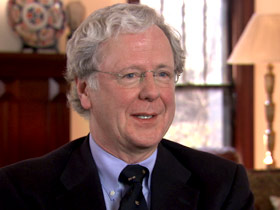 COPENHAVER: Ministers are always being plied with food. It’s one of the things if you pay a call on somebody they have a coffee cake.
COPENHAVER: Ministers are always being plied with food. It’s one of the things if you pay a call on somebody they have a coffee cake.
ABERNETHY: Martin is the son and grandson of ministers, comfortable with many styles of worship.
COPENHAVER (speaking to congregation): This is our sabbath, our day of rest, a word that means literally a day for quieting the heart.
ABERNETHY: Martin puts a high priority on encouraging young people to consider becoming ministers and on training young ministers on the job. So does Lillian.
DANIEL: I remember I was an intern in divinity school at my first church, and the minister, my supervisor, turned to me in the meeting and said, “Lillian, would you like to open us with prayer?” And I said, “No, I wouldn’t like to.” You know, I thought he was just asking if I wanted to, and later he said that’s not an option, and I said, well, I don’t know how to do it, and he said nobody knows how to do it. You just have to do it.
COPENHAVER: The way to learn how to pray is to pray.
ABERNETHY: Sometimes, even the most experienced ministers face situations that test them, such as one that faced Martin when he taught a Sunday school class of very smart fourth graders—ten year olds.
Sunday school class: What came before God?
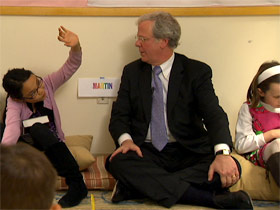 COPENHAVER: Oh, man, that’s a good one.
COPENHAVER: Oh, man, that’s a good one.
Sunday school class: Where is heaven?
COPENHAVER: Heaven is where God is.
Sunday school class: How do we know God exists?
Sunday school class: If God is good, why did he also create bad?
COPENHAVER: That is the biggest puzzle.
ABERNETHY: At last, the closing prayer.
COPENHAVER (praying with children): So God, we thank you that we might continue to stretch our hearts and minds toward you, never being afraid to ask and always seeking to learn.
ABERNETHY: I asked both pastors how they had known they were being called to ministry.
COPENHAVER: A sense of being compelled: I cannot not do this.
DANIEL: You keep coming back to it over and over again. When you try to walk away it is impossible.
ABERNETHY: Both pastors say the satisfactions, for them, far exceed the problems.
COPENHAVER: We are invited in and given privileged access to people’s lives, and that is not always joyous in the happy sense, but it’s a great, deep, abiding joy to share in people’s lives in that way.
DANIEL: Most clergy would far prefer to do a funeral than a wedding. You feel that the work that you are doing is profoundly important, and you are there to say something that nobody else in the world can say.
COPENHAVER: We get a chance to be wise. Not that all ministers are wise, but we get a good crack at it, because we see people in a variety of circumstances. We meet at that intersection of a human and the divine. We live in community. Wisdom is always acted out in community.
(to congregation): Go in peace.
Ministry is a lot like parenting in that it can be really difficult at times, but it never feels not worth doing. It really is joyous work.
DANIEL: God calls you just as you are, and you don’t have to be this phony-baloney person. You’ve been called to be exactly as you are and in that to proclaim this Word that is bigger than yourself.
ABERNETHY: Lillian and Martin’s book is This Odd and Wondrous Calling.


